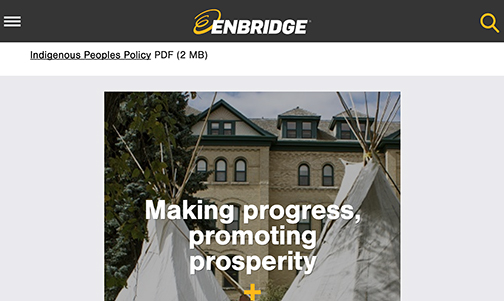By Winona LaDuke
“We commit to working with Indigenous communities in a manner that recognizes and respects those legal and constitutional rights and the traditional lands and resources to which they apply…” – Enbridge Aboriginal People’s Policy
In late October, the White Earth Ojibwe issued a cease and desist order against Enbridge for conducting an illegal training within the borders of the White Earth reservation. Tribal resolutions have barred Enbridge from conducting business on the reservation, without approval of the Tribal Historic Preservation Officer and Tribal officials.
Enbridge, seeing more pressure to complete a highly contested pipeline, seems to be taking off the gloves and going on the offense against tribes. Between October 7th and October 11th, Enbridge attempted to complete a “Para Archeology Certification Training for Cultural Monitors” in Mahnomen. Most certifications would require years. However, Enbridge remains hopeful that it can complete a new assessment in a timely manner. The “Para Archeology Certification” is being conducted by Enbridge and Seven Bisons Consulting, without tribal approval.
On October 8, Tribal Attorney Veronica Newcomer issued a cease-and-desist letter to the Enbridge , noting that the White Earth Nation had adopted a White Earth Nation Research Code and had affirmed that any archeological activities would have to be approved by the White Earth Tribal Historic Preservation Officer. “You are hereby ordered to cease-and-desist the Enbridge Tribal Cultural Monitor and Survey Technician Training on or around the White Earth reservation,” Newcomer wrote in a letter to Enbridge’s attorneys.
Despite White Earth jurisdiction, the corporation has been working with Gordon Construction, a tribal contractor, in an attempt to carry out activities on the reservation. In a letter to the White Earth Tribal Council, Gordon Construction questioned the Tribal Historic Preservation Officer’s (THPO) duties, noting that the tribal policies require approval by THPO for any work which would involve significant tribal cultural resources.
“Line 3 is not just a pipe in the ground, it’s a perfect opportunity to have real life economic progress for our Tribal Members”, Gordon Construction wrote to the White Earth Tribal Council, in an undated letter. Gordon is basically calling on the tribe to dismiss a tribal officer in order to accommodate Enbridge.
Earlier this fall, Enbridge sued the Bad River Band of Ojibwe in Wisconsin, seeking to force the tribe to keep a 60-year-old pipeline on the reservation, despite the tribal lawsuit in federal court demanding that Enbridge remove the pipeline as the easements had expired in 2013. The Bad River Band of the Lake Superior had filed a complaint in July claiming that Enbridge’s Line 5 pipeline is “a grave public nuisance” that poses an ever-worsening oil spill threat to the tribe’s northern Wisconsin reservation, noting that 11 of the l5 easements crossing the reservation had expired in 2013, and that Enbridge was operating without an easement.
After the Federal Court filing, Enbridge said it would work with the tribe and respect their sovereignty. Noting, however, “Enbridge is surprised and disappointed by the legal action taken by the Bad River Band of Lake Superior Chippewa, following extensive efforts of the parties through good faith negotiations and formal mediation. We remain committed to communicating with Bad River and are hopeful we can address the band’s concerns.”
Subsequent meetings on possible alternative routes for Line 5 were met with opposition and hostility, particularly in Mellon, Wisconsin. There the company was told not to return as the citizens of Melon were opposed to the pipeline.
Finding few friends off reservation, Enbridge filed suit against Bad River, asking the courts to force the tribe to comply with a 1992 agreement that the company contends requires the tribe to allow Line 5 to stay in operation until 2043 “on any reservation land in which the band has an interest” and requires the tribe “to provide assistance in obtaining easements across any non-band-owned land as well.” The agreement “certainly did not and does not permit the band to file this litigation seeking to remove the Line from the reservation prior to 2043,” the company argued.
The Bad River Band claimed in its counter-complaint that Enbridge is now illegally operating the pipeline across the Bad River Reservation, as easements have indeed expired. The tribe alleged that Enbridge sends as much as 23 million gallons of oil and natural gas liquids through Line 5 across the reservation.
Tribal Chairman Mike Wiggins said. “Our waterways are the lifeblood of the tribe. They represent our ancestors and our past and they represent all of our hopes and dreams for the future. We are done playing games in dealing with this perpetual dance with danger.”
With increasing climate change impacts, the region is at risk for more extreme weather and flooding as the planet warms. Indeed, huge storms have laid bare large segments of the pipeline on the Bad River reservation. The Bad River is a force unto itself, and meanders wherever it wants. That’s dangerous for pipelines.
For example, on the Yellowstone River in Montana, ruptured pipelines leaked 93,000 gallons of oil. Citing seven ruptures across the country in the past three years, the Pipeline and Hazardous Materials Safety Administration, the federal regulator responsible for the safe operation of the country’s energy pipelines, issued an advisory to pipeline owners earlier this year urging them to enact various safeguards. Those haven’t happened on Bad River.
“No amount of compensation is worth risking Wenji-Bimaadiziyaang – an Ojibwe word that literally means ‘From where we get life.’ It’s time to end the imminent threat the company is presenting to our people, our rivers, and Gichi-Gami [Lake Superior]”, Chairman Mike Wiggins said. Bad River turned down a $24 million offer from Enbridge in October. It appears that if a tribe takes money, (ie: says yes in consultation), Enbridge will bestow gifts. If “consultation” means “no”, Enbridge will sue the tribe. That seems fair, right? At some point No should actually mean No. Consultation is not the same as consent, and the human rights standard internationally is “free, prior and informed consent”. Simply stated, No means No, if you are a woman, or if you are a First Nation. Consent is the standard of this millennium.
As controversies over Line3 and 5 continue to grow, the company seems to be “taking off the gloves,” and their aboriginal people’s policy has been sent to the burn pile.







